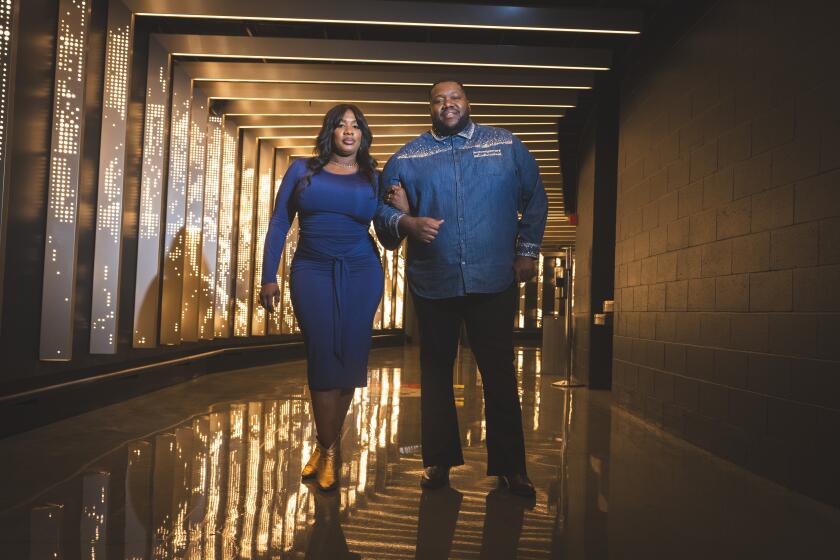Slash is one of hard rock’s guitar heroes. He’s still got the blues
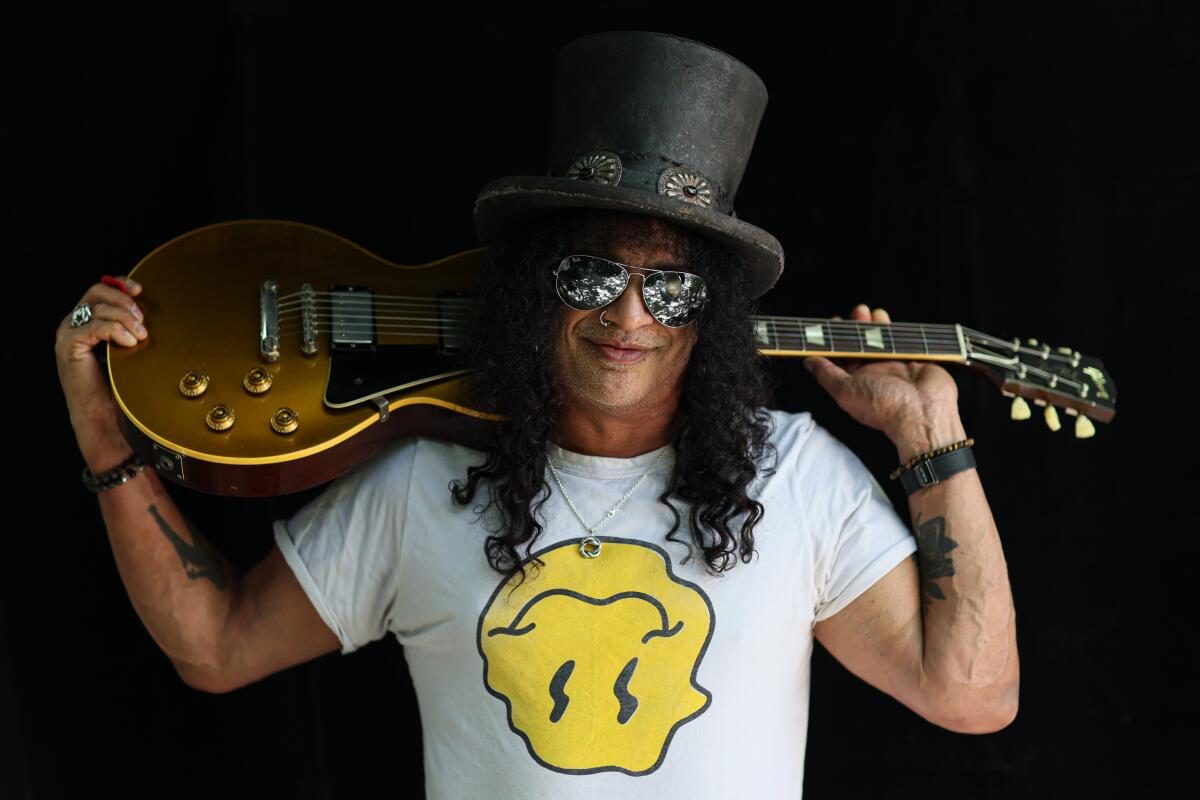
- Share via
When you’ve reached the pinnacle of rock ’n’ roll superstardom while remaining one of the most iconic and recognizable guitarists in the world for more than 35 years, what do you do for a fun little break? For Slash (born Saul Hudson), the answer is: Spend a few weeks throwing together a blues cover album with some old friends and then recruit some of the music world’s biggest vocalists from the last 60 years to sing on it.
That’s how “Orgy of the Damned” came about when he had a little time between tours last year. With 11 classic blues covers (each featuring a different vocalist) and an original instrumental closer, it likely competes with his self-titled solo debut as the most star-studded album Slash has ever put together. Featuring everyone from veteran rock legends like Billy Gibbons, Iggy Pop, Brian Johnson and Steven Tyler to current musical superstars such as Gary Clark Jr. and Chris Stapleton performing on songs written by artists like T-Bone Walker, Stevie Wonder and Howlin’ Wolf, “Orgy of the Damned” has more name recognition than most major albums with years of planning around them — even if it was mostly just an impromptu jam session.
“The idea to do this record had been sitting in the back of my head for years, and then all of a sudden I felt an urgency to do it right then and there,” Slash recalls, noodling on a Les Paul in the desk chair of his private studio in Encino. “We booked a little rehearsal room in North Hollywood for two weeks and then had a week to record before I had to leave again. We picked all the different songs that I had earmarked for this and just started jamming them. It was really cathartic for me to just play some straight-up blues stuff. I didn’t have to give it too much thought. It was really just for the fun of it.”
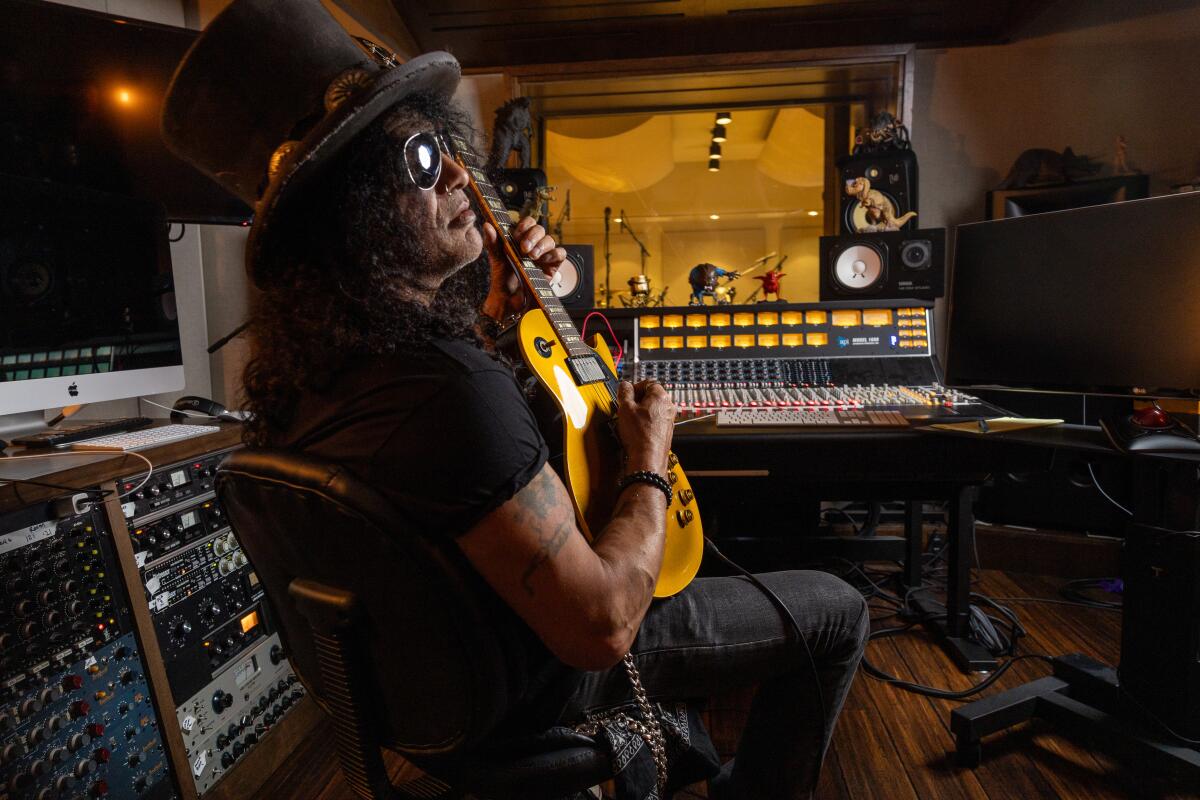
While Slash might be best known as a rocker thanks to his decades of work with acts like Guns N’ Roses, Velvet Revolver and the Conspirators, “Orgy of the Damned” is far from his first foray into blues. In addition to his “drunken cover band” in the late ’90s called Slash’s Blues Ball (whose bassist and keyboardist play on the new album), the legendary top-hat-wearing guitarist cites the genre as one of his early inspirations and also what he still gets excited about today. In fact, it’s the current blues renaissance — led by some of Slash’s newest collaborators and tourmates, like Gary Clark Jr. and Christone “Kingfish” Ingram — where he finds some of his favorite modern guitarists (both to listen to and to play with) more often than the rock world.
“There are some amazing guitar technicians out there, but it reminds me of the way that skateboarding has evolved,” Slash says, looking off to the side behind his signature aviators and top hat. “Everyone’s so technical now — and there’s some really interesting and impressive stuff that’s come out of it — but there’s only a few guitar players who I really like these days. There’s a guy named Chris Buck, who’s a really great blues guitar player. I helped him to get a visa to come here, and then I called the Troubadour to get him a gig. You see all these young blues artists really going for it and getting really f— good. That’s a genre that’s really thriving and alive and fresh at the moment, whereas it’s a little bit few and far between for me to find interesting things to listen to in rock. I think what’s really exciting for me is when the guitar is in context as a melodic part of a song. That’s what’s always turned me on, and there’s such a lack of that going on [in rock music]. There’s all these guitar players that sound amazing by themselves, but it doesn’t really fit inside of a composition of an exciting band.”
To celebrate both the ongoing blues revival and his new album, Slash put together S.E.R.P.E.N.T. Festival, a touring blues fest that brings together some of the genre’s top acts for a good cause. Instead of just going on a normal tour in support of “Orgy of the Damned,” S.E.R.P.E.N.T. (Solidarity, Engagement, Restore, Peace, Equality N’ Tolerance) is partnering with organizations like the Equal Justice Initiative, Colin Kaepernick’s Know Your Rights Camp, the Greenlining Institute, War Child and the National Alliance on Mental Illness to bring both money and awareness to a variety of causes that the guitarist finds important.
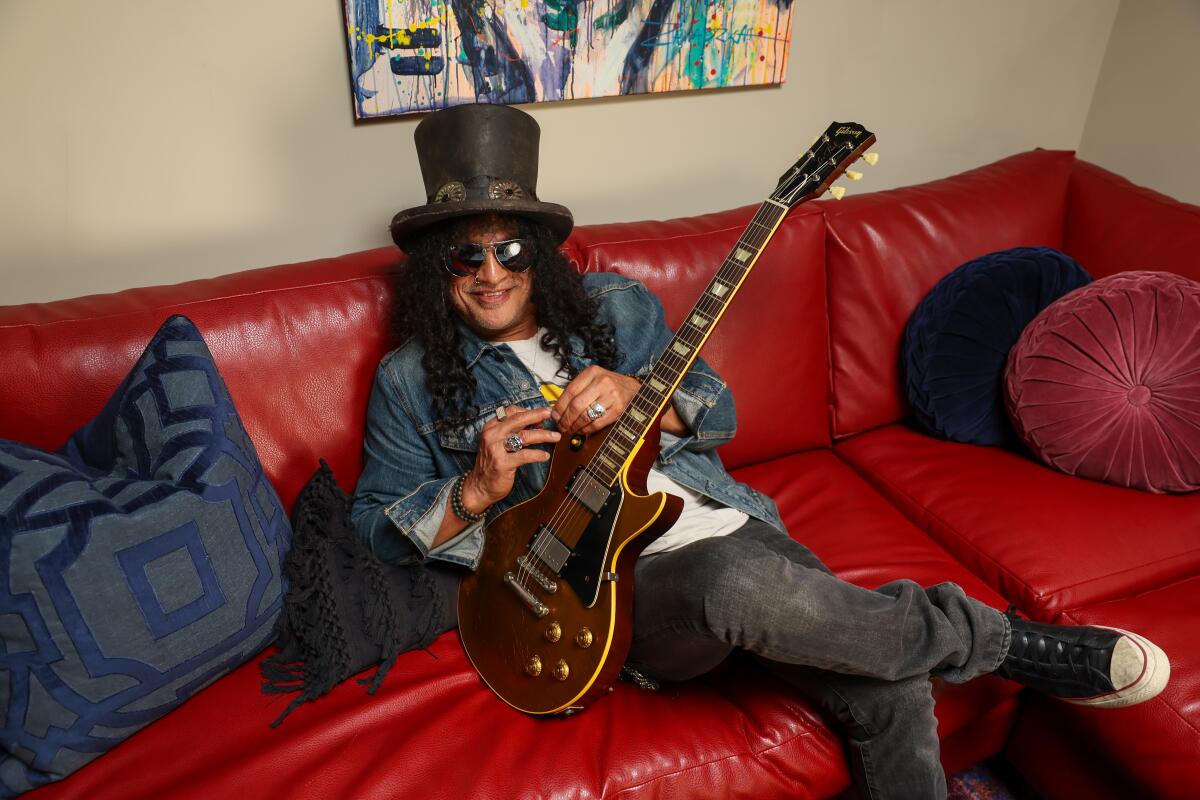
But even beyond the charity aspect of the festival — which makes its L.A. stop on July 13 at the Greek Theatre — Slash hopes that S.E.R.P.E.N.T. can bring a diverse audience together to celebrate music that they all enjoy. After all, the guitar hero will bring plenty of his own fans, but the all-star blues crew featuring names like Kingfish, Samantha Fish, Keb Mo and Warren Haynes should also draw an audience that couldn’t care less about his hard-rock background.
“I’m not what you would call a big political or social advocate, but I just feel like in this really crazy time we’re living in, where there’s so much division going on and so much pending negativity for what’s about to happen, I’d like to do something that had a positive message,” Slash says. “That’s what blues music is all about anyway. I wanted this festival to be inclusive to all people and not to promote any kind of one-dimensional influence, but I also wanted to support people who have been on the fringes over the last 10 years. There have been a lot of racial issues, a lot of poverty, a lot of homelessness and mental issues that are all happening and it’s all very ripe right now. So I wanted to address that and find some charitable organizations to give back a little bit.
“When I was putting the bills together, I wanted to have guys that I’ve become aware of within the last five to 10 years and guys I’ve known for a really long time to have a cool mixture of very vibrant blues artists,” Slash continues. “I don’t even really know [what the audience will be like]. I guess we’re just going to do it. It’ll be a mix of different things, and it’s a broad-based blues kind of gig. There’s the stuff that we do, which is very blues-driven, but there’s also rock ’n’ roll — and it’s all still delivered with a certain energy, but it’s not all Marshall stacks. I think it’s going to bring in a lot of people just to see what’s going on, because it’s going to be really fun and entertaining and cool for people. I don’t think anybody knows exactly what’s going to happen.”
As for the never-ending discussion of whether there’s still a place for the true “lead guitarist” in modern rock music, Slash doesn’t seem particularly concerned. On one hand, he’ll tell you that the Los Angeles music scene hasn’t been the same since Guns N’ Roses returned from their tours supporting “Appetite for Destruction” in the late 1980s and the music industry as a whole has been destroying talented artists in favor of radio-friendly Top 40 hits for decades. But at the same time, he’s already seeing the next generation of artists start to understand the imperfect beauty and humanity found in the guitar-based music of yesteryear.
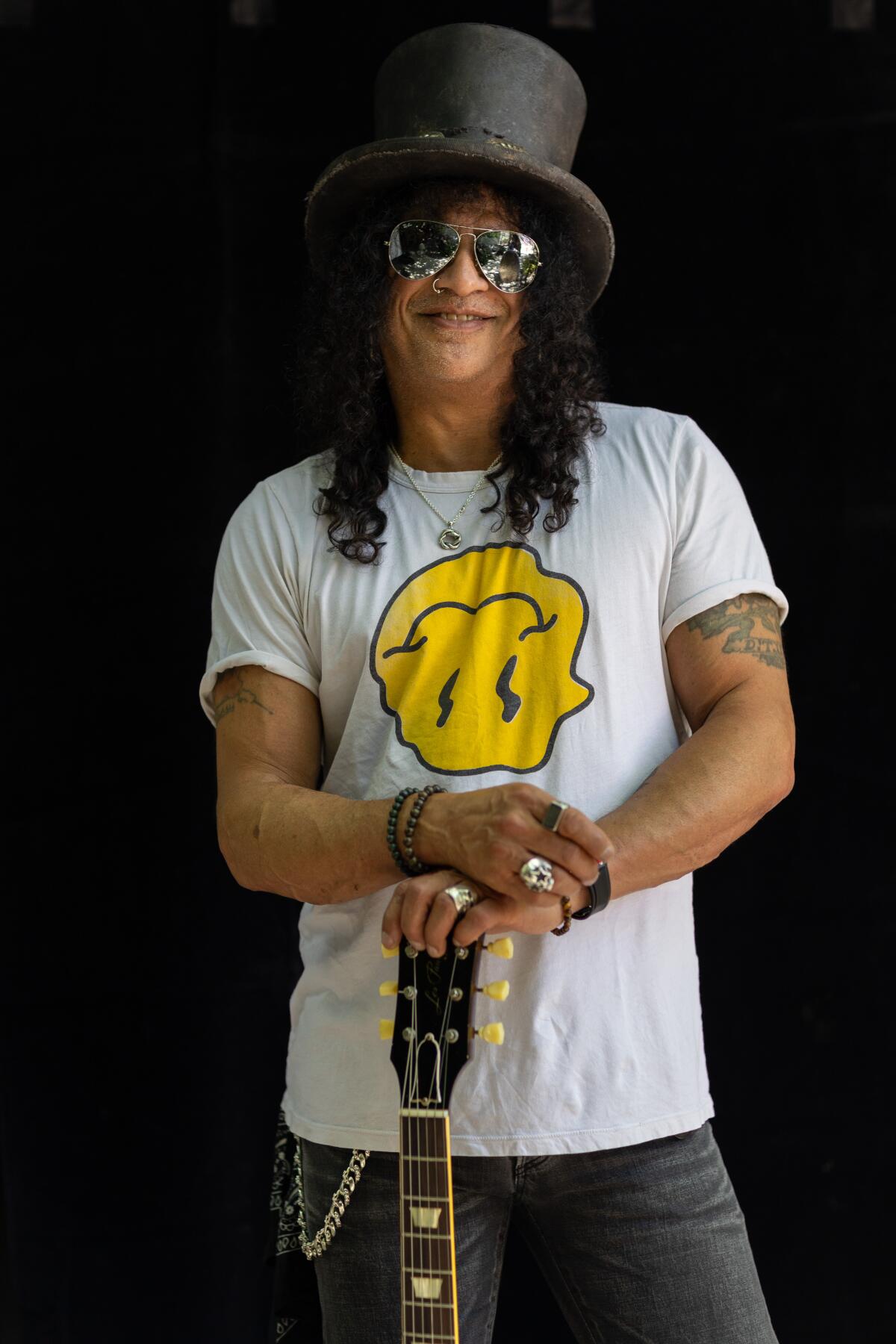
“Until something really touches you, you lose interest in it until it gets to the point where you forget why it was ever important,” Slash says of lead guitar parts. “There’s a lot of music that’s historic and means so much to people, and that’s why there are so many great heritage bands.”
For the new stuff coming up, however, the music industry has become so corporate that there’s no risk-taking or development, Slash says. There’s none of what used to happen when you’d find a really talented artist, bring them in, present them to the world and develop them. “Now you need to make a Top 40 hit or they don’t have time for you, and that’s the record business,” he continues.
The legendary guitarist is convinced that young music fans and musicians aren’t interested in the corporate thing anymore. “They’re discovering that we went through this really crappy digital period where people didn’t care about the quality of the sound, but that there’s some really great-sounding old stuff, and they’re just creating something on their own,” he said. “I think something will come out of that, catch everybody’s ear, and start a wave of stuff that’s not really industry-driven. Then eventually the industry will catch on to that too.”
More to Read
The biggest entertainment stories
Get our big stories about Hollywood, film, television, music, arts, culture and more right in your inbox as soon as they publish.
You may occasionally receive promotional content from the Los Angeles Times.
